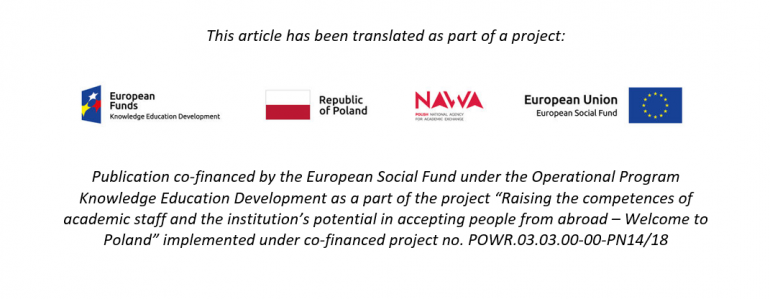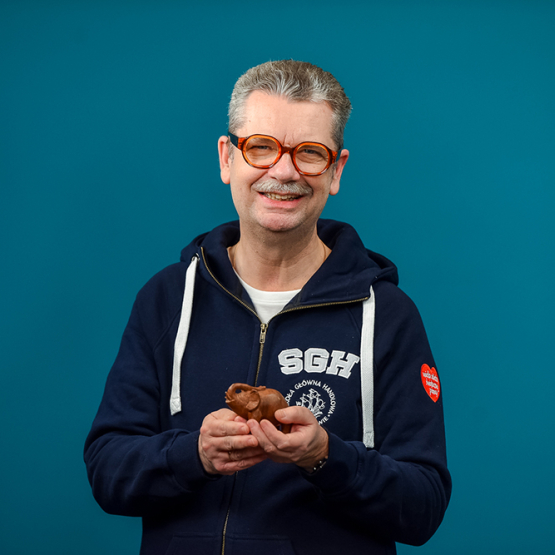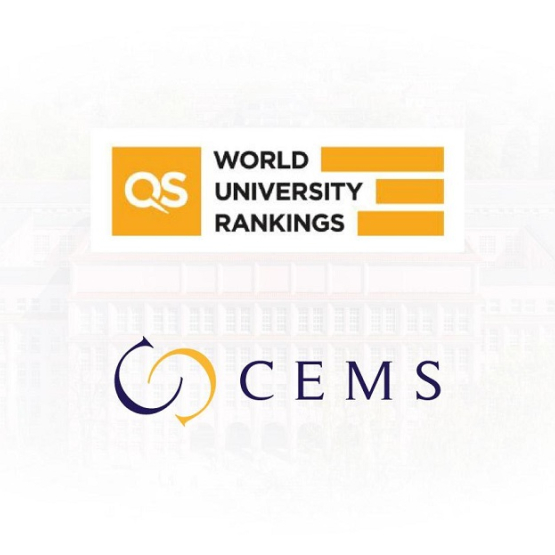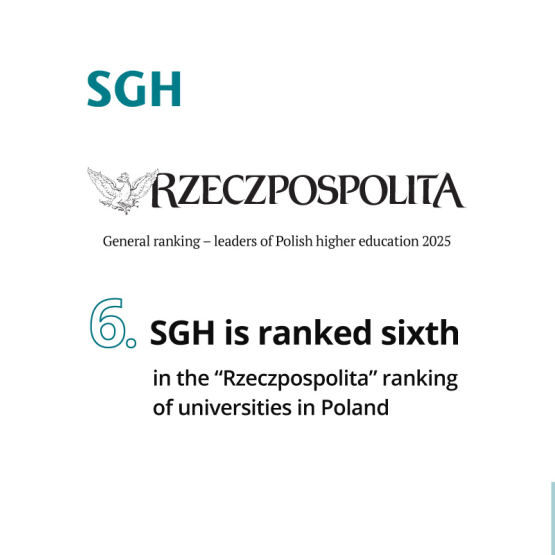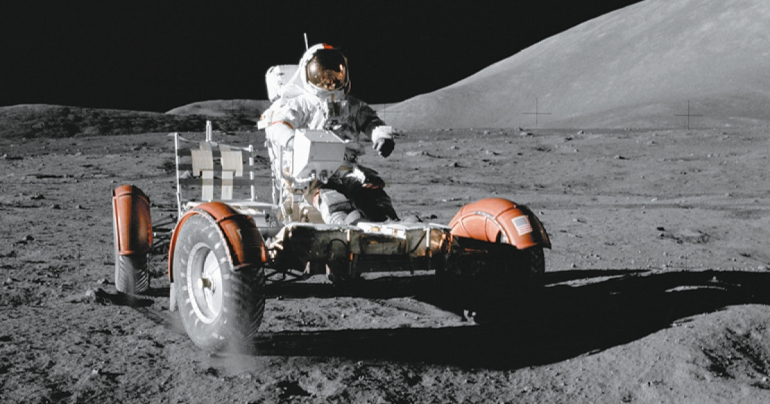
On Tuesday, February 19, 2019, we could witness a unique astronomical phenomenon, the so-called Full Snow Moon, when the Moon reached the perigee of its orbit, i.e. was at the point situated closest to the Earth. It was a special evening for NAWA (The National Agency for Academic Exchange) as well because the Inaugural Gala of the Bekker Programme was held on this very day.
AND IT WAS NOT A COINCIDENCE
Professor Mieczysław Grzegorz Bekker, patron of the Programme, had much in common with the Moon. He was the creator of the Rover lunar vehicle, used in the 15th, 16th and 17th Apollo missions to the Moon. The meeting place was not accidental, either. The scholarship holders of the first year of the programme met in the Conference Hall of the Physics Faculty at the Warsaw University of Technology, prof. Bekker’s alma mater. He graduated from its Mechanical Department and was subsequently employed at the Institute of Engineering Studies.
The event was opened by dr Zofia Sawicka, NAWA (the Polish National Agency for Academic Exchange) Deputy Director, and the event moderator - Anna Chylak, Head of the NAWA Promotion and Communication Department. The participants of the meeting had an opportunity to listen to three interesting speeches addressed to scholarship holders and the remaining guests of the gala. Doctor Andrzej Selenta presented the biography and achievements of prof. Mieczysław Grzegorz Bekker. The lecture conducted by prof. Agnieszka Zalewska, President of the CERN Council in the years 2013–2015, on multifaceted internationalisation in the researcher’s life - private and professional - was an inspiration for all listeners attending the ceremony. The professor focused on the importance of interweaving and complementary planes related to research conducted outside the country of one’s origin. They concern both the researcher’s professional development, private life, personal development and a broader scope of work for science development in Poland.
During the event, ‘the Bekkers’ received commemorative booklets from Director Zofia Sawicka and prof. Wojciech Grochala. The whole event was complemented by a festive banquet, during which scholarship holders and invited speakers had an opportunity to network and exchange experiences.
156 CO-FINANCED PROJECTS
156 scholarships were awarded to best applicants in the first edition of the Bekker Programme. Polish scientists will be hosted at renowned centres around the world. The most popular destinations included the United States (41 scholarships awarded), Germany (21), Great Britain (16), Italy (12) and Australia (11). By far the majority of the financed projects (68) relate to the area of natural sciences. Scholarships were also granted to 37 researchers from the field of social sciences and 32 researchers specialising in engineering and technical sciences. The Bekker Programme scholarship holders will have the chance to implement their projects in a renowned scientific community and establish long-term cooperation during their visits lasting from 3 to 12 months.
BEKKERS FROM SGH
This year's scholarship holders included three academics from SGH: dr hab. Katarzyna Pisarska, prof. SGH, Department of Political Studies, dr hab. Maciej Malicki, prof. SGH, Mathematics Unit, and dr Lucas van der Velde, assistant professor at the Applied Statistics Unit.
Professor Katarzyna Pisarska has already left for the United States. She implements her project Managing Crisis through Collaborative Public Diplomacy at the University of Southern California (USC), which is the only university in the world conducting in-depth research in the field of public diplomacy and offering master's and doctoral studies in this field (USC Center for Public Diplomacy). Professor Pisarska plans, inter alia, to develop a model of Cooperative Public Diplomacy, conducting 10 qualitative interviews with American decision-makers which will be included in the first case study, publication of the book prepared for the Palgrave Publishing House (public diplomacy on the USA-France line during the war in Iraq). During her stay, she will also conduct workshops for students and open seminars presenting research results from the book Domestic Dimension of Public Diplomacy - Evaluating Success through Civic Engagement (Palgrave 2016). Additionally, the stay in California is to result in the establishment of permanent cooperation between the USC Centre for Public Diplomacy and SGH Warsaw School of Economics with a view to launching post-graduate studies in public diplomacy in the future.
Moreover, prof. Maciej Malicki conducts research in France (Université Claude Bernard, Lyon) as part of the project entitled: Polish Groups as Automorphism Groups of Structures.
Dr Lucas Augusto van der Velde will start the implementation of the project Automation and Employment Polarisation in Transition Countries: A Political-Economic View in autumn this year at the Faculty of Economics of the American University of California Berkeley, which belongs to the most prestigious economic faculties in the world. The university can boast five Nobel Prize winners in economics. It organises, among others, regular seminars at which critical economic trends are discussed. The indicated seminars are an invaluable opportunity not only to learn about the latest research, but also to meet the next generation of economists in person and discuss possible research networking with them.
The research planned by dr. van der Velde will focus on analysing the causes of disparities between Eastern and Western Europe, especially in terms of tasks that are less likely to be automated. The indicated analysis will result in an attempt to answer several research questions, including: What is behind the increase in routine employment? Is it just a question of prices, cheap work in Eastern Europe, or is the legacy of the communist era still responsible for it? Are there any cultural factors that can help explain this discrepancy? What is the role of individuals in this development? Do they adjust their input data to tasks in compliance with theory? During his stay in the USA, Dr. van der Velde plans to work with Professor Gerard Roland, an eminent scientist whose analyses are crucial for the understanding of the process of economic transformation in Central and Eastern Europe.
We wish this year's scholarship recipients a real scientific adventure experienced during their visits under the Bekker’s Programme and we encourage others to try their hand at the next year's edition of the programme.
Mieczysław Grzegorz Bekker (1905–1989) – a Polish mechanical engineer, a great scientist, a specialist in off-the-road locomotion vehicles. He was the precursor of science called terramechanics and co-creator of the Lunar Roving Vehicle (LRV,) for the Apollo programme. He was a graduate of the Warsaw University of Technology. The title of doctor honoris causa was conferred upon him by the Polytechnic in Munich, Carleton University in Ottawa and the University in Bologna. The professor’s name was forever written on the Space Walk of Fame, Titusville, USA.
The task of the Polish National Agency for Academic Exchange (NAWA) is to support academic exchange and international cooperation to strengthen the potential of Polish science and higher education. The policy to support academic mobility and pro-quality internalisation of the offer of Polish universities is conducted, among others, through the implementation of programmes addressed to students and academics from Poland and abroad. Additionally, the NAWA tasks include facilitating individual academic mobility aimed at increasing the didactic and scientific potential, as well as supporting the process of internationalising the university’s curriculum offer and promoting Polish, higher education and the Polish language abroad.
